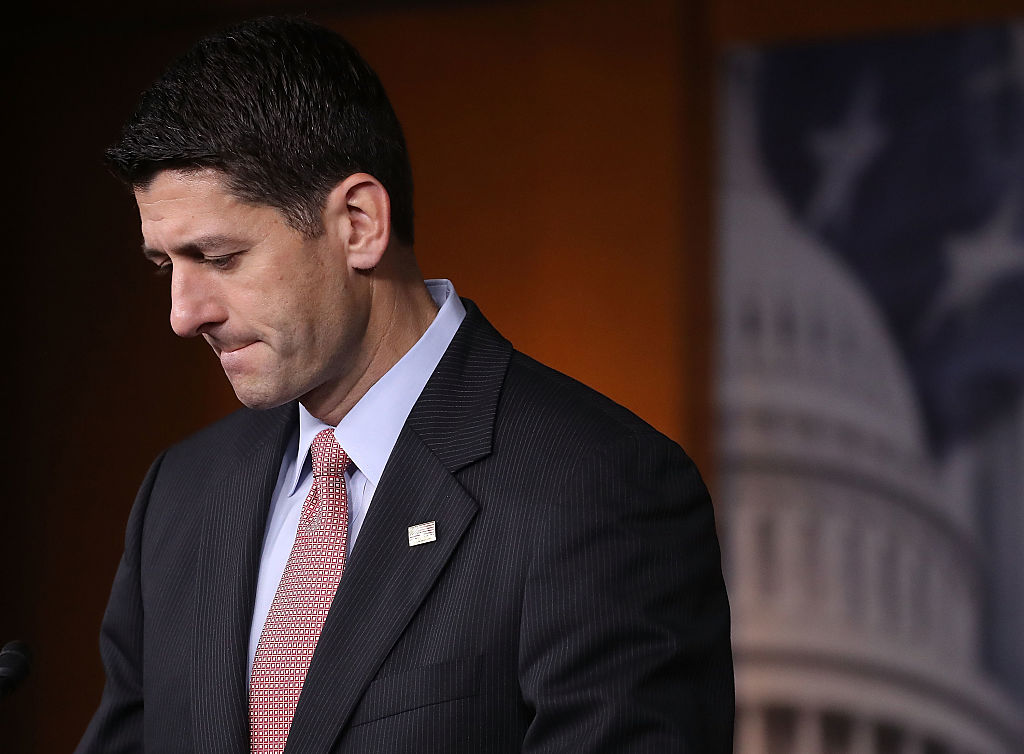Paul Ryan would've been a lock to win re-election. Without him, the GOP has a problem.


A free daily email with the biggest news stories of the day – and the best features from TheWeek.com
You are now subscribed
Your newsletter sign-up was successful
House Speaker Paul Ryan (R-Wis.) has decided not to run for re-election, Axios reported Wednesday. The speaker has apparently told "confidants" that he will announce his decision to retire "soon."
Ryan represents Wisconsin's 1st District, where he's an extremely strong candidate. He won re-election in 2016 with 65 percent of the vote — but perhaps more troubling for the GOP, he won the Republican primary with a whopping 84 percent of the vote, defeating hard-right candidate Paul Nehlen, a person with views so far on the fringe that the Wisconsin Republican Party disavowed him earlier this year.
The filing deadline in Wisconsin is June 1, so should Ryan confirm his retirement plans, the state party would have a bit of time to find a suitable alternative candidate to Nehlen. But even still, Cook Political Report's David Wasserman notes, while Wisconsin's 1st may have been a lock for the GOP under Ryan, that's not so much the case without him:
The Week
Escape your echo chamber. Get the facts behind the news, plus analysis from multiple perspectives.

Sign up for The Week's Free Newsletters
From our morning news briefing to a weekly Good News Newsletter, get the best of The Week delivered directly to your inbox.
From our morning news briefing to a weekly Good News Newsletter, get the best of The Week delivered directly to your inbox.
Rumors that Ryan had reached his limit with the speakership — a job he very publicly didn't want — have swirled for months now, as he has struggled to maintain his reputation as the GOP's moral leader while balancing a relationship with President Trump. But if he indeed walks away from the House, it's a sign of trouble for the GOP: "This is a Titanic, tectonic shift," one Republican insider told Axios. "This is going to make every Republican donor believe the House can't be held."
Democrats need to flip 24 Republican seats to win the House in this year's midterms. Read more about what might happen if they pull it off here at The Week.
A free daily email with the biggest news stories of the day – and the best features from TheWeek.com
Kimberly Alters is the news editor at TheWeek.com. She is a graduate of the Medill School of Journalism at Northwestern University.
-
 The Epstein files: glimpses of a deeply disturbing world
The Epstein files: glimpses of a deeply disturbing worldIn the Spotlight Trove of released documents paint a picture of depravity and privilege in which men hold the cards, and women are powerless or peripheral
-
 Jeff Bezos: cutting the legs off The Washington Post
Jeff Bezos: cutting the legs off The Washington PostIn the Spotlight A stalwart of American journalism is a shadow of itself after swingeing cuts by its billionaire owner
-
 5 blacked out cartoons about the Epstein file redactions
5 blacked out cartoons about the Epstein file redactionsCartoons Artists take on hidden identities, a censored presidential seal, and more
-
 Judge blocks Hegseth from punishing Kelly over video
Judge blocks Hegseth from punishing Kelly over videoSpeed Read Defense Secretary Pete Hegseth pushed for the senator to be demoted over a video in which he reminds military officials they should refuse illegal orders
-
 Trump’s EPA kills legal basis for federal climate policy
Trump’s EPA kills legal basis for federal climate policySpeed Read The government’s authority to regulate several planet-warming pollutants has been repealed
-
 House votes to end Trump’s Canada tariffs
House votes to end Trump’s Canada tariffsSpeed Read Six Republicans joined with Democrats to repeal the president’s tariffs
-
 Bondi, Democrats clash over Epstein in hearing
Bondi, Democrats clash over Epstein in hearingSpeed Read Attorney General Pam Bondi ignored survivors of convicted sex offender Jeffrey Epstein and demanded that Democrats apologize to Trump
-
 El Paso airspace closure tied to FAA-Pentagon standoff
El Paso airspace closure tied to FAA-Pentagon standoffSpeed Read The closure in the Texas border city stemmed from disagreements between the Federal Aviation Administration and Pentagon officials over drone-related tests
-
 Judge blocks Trump suit for Michigan voter rolls
Judge blocks Trump suit for Michigan voter rollsSpeed Read A Trump-appointed federal judge rejected the administration’s demand for voters’ personal data
-
 US to send 200 troops to Nigeria to train army
US to send 200 troops to Nigeria to train armySpeed Read Trump has accused the West African government of failing to protect Christians from terrorist attacks
-
 Grand jury rejects charging 6 Democrats for ‘orders’ video
Grand jury rejects charging 6 Democrats for ‘orders’ videoSpeed Read The jury refused to indict Democratic lawmakers for a video in which they urged military members to resist illegal orders
